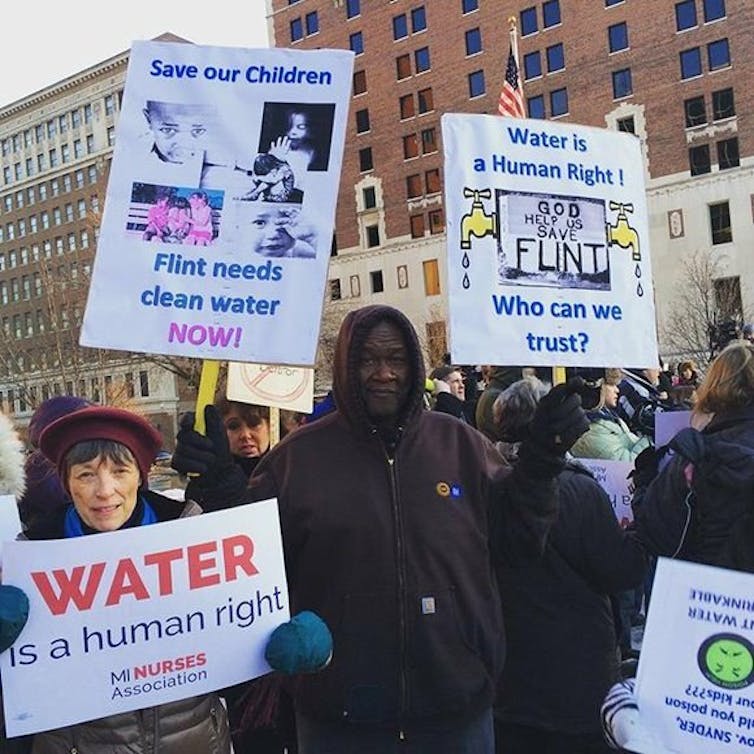
By Reshma Ramachandran
Mass layoffs at the Department of Health and Human Services are continuing as the agency makes good on its intention, announced on March 27, 2025, to shrink its workforce by 20,000 people. Among workers dismissed in early April were several teams responsible for fulfilling requests for access to previously unreleased government data, information and records under a federal law known as the Freedom of Information Act, or FOIA.
At the Centers for Disease Control and Prevention, the offices that fulfill such requests have been eliminated, according to press reports. In 2024 alone, CDC received 1,800 requests for access to public records. At the Food and Drug Administration and National Institutes of Health, which together responded to almost 14,000 requests in 2024, multiple teams of FOIA staff were fired. FOIA offices at other HHS agencies were affected, too.
Most people may never file a public records request with a federal agency. But the fact that anyone is allowed by law to do so enables the public to hold government accountable and has catalyzed important government reforms. FOIA requests at federal health agencies have been particularly consequential. They have pushed companies to take unsafe drugs off the market, led to reforms that prevent unnecessary delays in communicating public health risks, and prompted policies that lower prices and improve access to taxpayer-funded health technologies.
I am a health services researcher who studies the effects of public health regulation, and I have observed how the transparency enabled by FOIA can benefit patients, clinicians and researchers. Although HHS Secretary Robert F. Kennedy Jr. has stated that federal public health agencies will embrace “radical transparency,” closure of these offices suggests otherwise.
What is an FOIA public records request?
The Freedom of Information Act was passed in 1966 to increase government transparency in response to a rise in government secrecy during the Cold War.
The law requires agencies within the federal government’s executive branch to proactively publish certain procedural and other materials and to publicly disclose certain types of information. It also requires the federal government to disclose any documents that don’t fall into those categories in response to a written request, as long as they are not exempt due to issues of national security, foreign policy or business interests.
Any member of the public, citizen or not, can file a FOIA request.
Notably, private companies are the top requesters. They use FOIA to gain competitive advantage, support litigation and become familiar with regulations and policies that affect their business model. The next most frequent requesters are everyday people. After them come law firms, which are often supporting private companies, followed by the news media and nonprofit organizations.
What can FOIA requests to federal health agencies reveal?
FOIA requests to HHS agencies have led to significant shifts in public health regulation and policy.
In one example from the early 2000s, researchers and media outlets filed FOIA requests to the FDA related to a drug called Vioxx, or rofecoxib. The drug, manufactured by the pharmaceutical company Merck, was approved by the FDA as a supposedly safer alternative for osteoarthritis pain. But the documents revealed that Merck had significantly downplayed the drug’s increased risk for heart attacks and strokes.
Information disclosed through these requests prompted congressional investigations that led to new laws requiring companies to report results of all clinical trials in a public online database – including when trials show that treatments have no meaningful benefit or are unsafe.
The new laws also authorized the FDA to require companies to conduct additional safety studies after a drug’s approval. This means the agency can take faster action to prevent patient harm by adding warnings to drug labels, issuing warnings of potential harms directly to doctors or withdrawing unsafe treatments entirely.
Importantly, FOIA enables ongoing oversight. In 2021, my colleagues and I published an investigation that used FOIA to determine whether the FDA and NIH were enforcing those clinical trial transparency laws. We found that companies had failed to update thousands of clinical trials in the database with their results, and that the FDA and NIH were doing little to compel them. Using the FOIA data as evidence, we successfully petitioned the FDA to step up its enforcement and to publicly list the companies that were still not complying.
There are countless other examples of how stakeholders have used FOIA to hold the government accountable. FOIA requests filed by lawyers, news outlets and citizens of Flint, Michigan, in 2016 revealed that state and local public health officials withheld information about the contamination of the city’s drinking water. Their secrecy potentially delayed response measures that could have prevented a recurrent disease outbreak.

Shannon Nobles/Amsterdam News via Wikimedia Commons, CC BY-SA
During the COVID-19 pandemic, FOIA requests to HHS agencies filed by news outlets and nonprofit organizations revealed that despite billions of taxpayer dollars and other resources invested into COVID-19 vaccine development, the U.S. government had waived away their ability to take future action and not negotiated terms to ensure affordable access if companies later hiked up prices.
What now for FOIA at HHS?
The sudden dismissal of FOIA teams at the CDC, FDA, NIH and other federal public health agencies will limit these agencies’ ability to respond to new and ongoing requests as required by law. This will worsen an already hefty FOIA backlog at HHS agencies.
Cuts to FOIA staff also hinder the public from using this law to examine and potentially challenge recent agency actions under the new administration. On April 5, 2025, the watchdog group Citizens for Responsibility and Ethics in Washington filed several FOIA requests on the involvement of the Department of Government Efficiency, or DOGE, in disbanding the FOIA team and on the CDC’s reported suppression in March of an expert assessment of the Texas measles outbreak.
Based on the automated response – which read that FOIA staff had been placed on administrative leave and could not respond to requests – the group filed a lawsuit challenging the FOIA office closure, arguing that it violates the Freedom of Information Act and other administrative law.
Limited staff capacity may also curtail agencies’ ability to proactively disclose information, such as data on drug efficacy and safety posted by the FDA. Patients and clinicians access such information to make decisions about using and prescribing medications.
HHS representatives have stated that they will resume FOIA processing, centralizing the various agency offices under HHS in a more streamlined approach. Whether such an office with significantly diminished capacity and a lack of agency-specific expertise will be able to effectively and efficiently respond to the over 50,000 requests for records received annually remains unclear.
A pattern of barriers to public input and accountability
FOIA is far from a perfect tool for achieving transparency in how the government regulates health and biomedical research and policy. In fact, at least at the FDA, FOIA is costly and inefficient – partly, as my colleagues and I have written, because of the agency’s self-imposed, burdensome protocols. But without an enforceable replacement strategy, it is the only tool available to the public.
The Trump administration has taken several other steps to reduce transparency of federal public health agencies, leaving the public with limited formal avenues outside of the courts to weigh in on agency actions.
On March 3, 2025, HHS rescinded a long-standing policy requiring it to solicit public comments on regulations related to public property, loans, grants, benefits or contracts. Advisory committee meetings where agencies convene independent experts to provide recommendations and where public stakeholders can provide input have been canceled or postponed.
Additionally, the newly formed Make America Healthy Again Commission led by Kennedy has met behind closed doors and without prior public notice, attended only by select, aligned members. It remains unclear if future meetings will be public.
Not only is closure of FOIA offices across HHS agencies yet another blow to government transparency, but it also prevents the public from holding agencies accountable and pushing for changes that improve health.
Reshma Ramachandran, Assistant Professor of Medicine, Yale University
This article is republished from The Conversation under a Creative Commons license. Read the original article.
![]()
Reshma Ramachandran is Assistant Professor of Medicine at Yale University.





























JimboXYZ says
Before DOGE, that concept of government accountability was just working so well/effectively, wasn’t it ?
Pogo says
@Reshma Ramachandran
Thanks sis. So, if I’m getting your drift here, these pricks in the so-called Department Of Government Efficiency, are making it, as a practical matter, damn near impossible for the FOIA to function in any useful way.
Meanwhile, the official federal government’s records of everyone, and everything, are being examined, copied, (and possibly altered, deleted, etc.) by a gang of anonymous punks who were privately recruited and employed by a group of drug and steroid crazed billionaire maniacs; theoretically to the benefit of us all, and certainly to their own — at our expense.
Well, hot damn. Less than a hundred days on the job and these creeps have stolen, wrecked, defamed, distorted, subverted and betrayed damn near everyone, and everything, their claws can reach.
maga?
Tony Mack says
There should be no doubt that these Musk’s computer gangsters are the ones who manipulated the voting tabulations to give Trump his “must win” totals in the seven close call states. Mark these words — there will be no free and fair elections in 2026. Having taken control of all aspects of the government, the Heritage Foundation and the billionaires supporting Trump will not risk losing their power through elections.
Congress has been neutered, the courts acquiesce to Trump and Musk controls the voting machines. The media has failed the American people and now bends the knee reporting only Republican propaganda.
Think Germany in the Thirties. End of story… end of democracy.
Laurel says
Tony Mack: As Trump’s *policies* get closer to home, and they will, the people will protest. People still feel fine now, but they are beginning to know someone who is directly effected.
Kennan says
Yeah, Jimbo, now there won’t be any accountability whatsoever!!! you get rid of Freedom of Information Act. what do you think that means? Game, Set, Match.